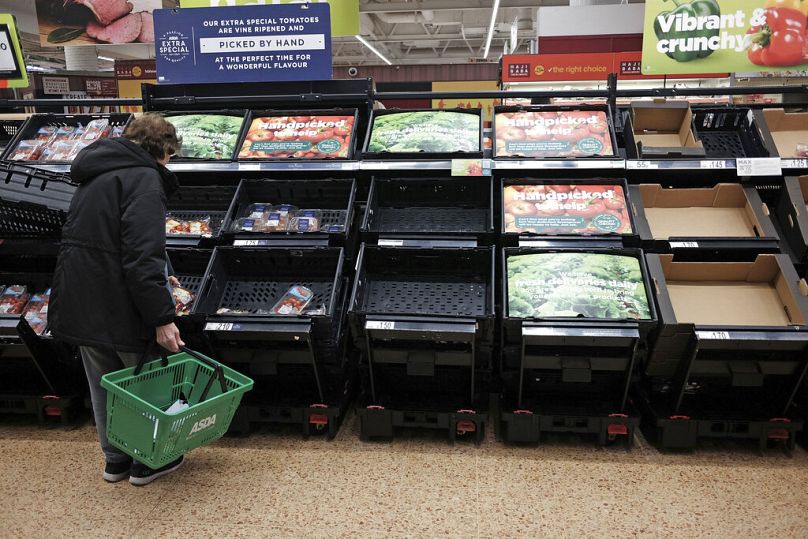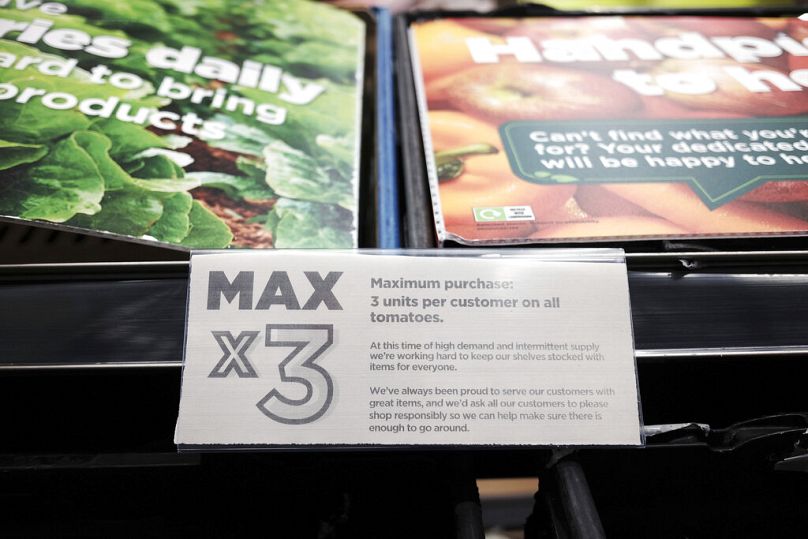#TheCube spoke to experts to find out why some of Britain's biggest supermarket chains are restricting the amount of vegetables customers can buy.
Tomatoes are temporarily out of stock in some British supermarkets this week, with empty shelves where there should be a colourful vegetable section.
It's been this way for several days now, as some major UK supermarkets haven't been able to buy enough fresh vegetables, particularly tomatoes - forcing several big chains to introduce limits.
Asda, Britain’s third largest grocer, was quick to respond with a cap of three packs per customer on tomatoes, peppers, cucumbers, lettuce, broccoli, cauliflower, and raspberries citing disrupted harvests in Spain and Morocco due to deteriorated weather conditions.
Morrisons, another leading British supermarket chain, set the limit to two items per person from 22 February.
On 23 February, the UK's Environment Secretary Therese Coffey told MPs that the shortages were caused by "very unusual weather" and urged a more seasonal approach to eating that embraces local harvests like turnips.
However, images posted by social media users from Spain and Morocco showed shelves stacked full of tomatoes and fresh vegetables, prompting people to link it to Britain’s post-Brexit trade woes.
At The Cube we decided to take a closer look and fact check the claims.
Is weather to blame for fruit and vegetable shortages?
Unusual weather is primarily to be blamed for the short supply, according to Andrew Opie, director of the British Retail Consortium which represents all the major supermarkets, including Tesco, whose fresh produce shelves were among those looking empty this week.
However, Jack Ward, CEO of the British Growers Association, told us that the shortage has its roots in increased energy costs.
“Last autumn, there were numerous conversations within the industry about the rising costs of production with higher energy prices and input costs. Growers took the view here in the UK and other parts of northern Europe that unless they could be guaranteed a reasonable return, they wouldn't plant the crops,” he added.
The “gamble” to compensate for the shortfall left by the lack of planting has not paid off, according to Ward.
“We've gone to places like Spain and Morocco where there's a more ready supply of sunshine at this time of year and production costs are cheaper. But there was never any way that was going to make up all of the production that we've lost,” Ward said.
According to the British Embassy in Morocco, about 25% of the UK's tomatoes come from the North African nation, while a further 20% come from Spain - making those two countries the UK's biggest sources of tomatoes.
The situation was aggravated by diminished tomato production in greenhouses of big producer countries like the Netherlands, primarily due to high energy costs, experts said.
Where does Brexit come into all this?
Contrary to some of the reaction on social media, Brexit has a minimal role to play in the immediate shortage, according to experts.
For example, the British Growers Association says one of the big issues arising from Brexit for the fresh produce sector - attracting workers from EU countries - has been mitigated by the Seasonal Workers Permit Scheme.
“It is more about being able to get back the investment the growers need to make in planting crops and that's where the system has fallen down rather than Brexit,” he added.
The location of the UK and its isolation from mainland Europe, however, has played a significant part and is the differentiator from the situation in EU countries without shortages of fruit and vegetables.
“It is less costly for a supplier to supply to the Netherlands and other countries in the northern part, because they don't have these 25 miles of the English Channel to negotiate because that adds a cost,” said Chris White of Fruit Net.
Navigating extra Brexit-imposed cost and bureaucracy of getting the fresh fruit and vegetables across the Channel is clearly proving too costly for some producers, which is why tomatoes are reaching supermarkets in France, Belgium or the Netherlands but not Britain.
And according to media reports Irish supermarkets have also reported depleted stocks of tomatoes and fresh produce, just like in the UK - but while geography (and related costs) will be a factor there, Brexit won't be.
UK’s lessons from the empty shelves
In addition to the lack of action to help growers with high energy prices, experts believe the UK’s complex supply chains have equally contributed to the situation, showing room for improvement.
However, Pekka Pesonen, Secretary General of Copa-Cogeca, a European agricultural umbrella organisation, said “tipping the delicate balance of trade channel” should have been avoided.
“The main message to the UK would be that our food supplies are highly integrated, highly complex set of measures all across all operators, all regions, countries and even outside the Union,” Pesonen said. “Disturbing this delicate balance, even if it's a minor change to the supply routes and supply chains, it may have a significant impact through operators that opt for the easier way somewhere else.”
Ward, CEO of the British Growers Association, emphasised being more realistic about the security of supply chains and better measures to encourage domestic production.
“We've got to be more realistic about the costs involved in producing food and the prices for which food is sold. There's got to be a closer dialogue between growers and retailers to make sure that we don't find ourselves in these kinds of situations in the future,” Ward told us.
When will the shelves fill up again?
According to the growers and experts we spoke to, the situation might take a couple more weeks to resolve depending on various factors.
“It depends on how badly the crops have been affected. Bad weather at the wrong time can be pretty disastrous,” Ward added.
The end of winter will see an increase in the harvest of seasonal fresh produce, which shall ultimately see a return to normality, experts that spoke to Euronews agreed.
Watch the video above for a video report on the UK's food shortages.













